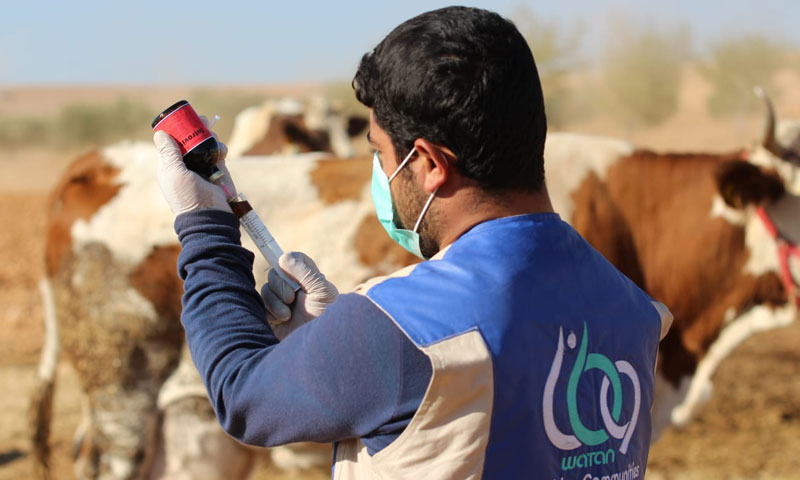Local organizations have launched a program for the development of the flexibility of the livestock breeders through the qualification of veterinary staffs, technicians and mobile clinics, as to support the livestock sector in Northern Syria.
The campaign was started by the “WATAN” foundation early in November; it lasted for 11 days, through which veterinarian doctors and technicians were trained in the rural parts of Aleppo and Idlib, to be followed with the activation of three mobile clinics in the same areas.
This took place through the launch of the “Cultured Barley” project by the foundation, in cooperation with local partners, for the campaign provided intensive professional training for women working in the same field, aiming at advancing the local product and enhancing the professionality of these workers.
The project targeted about five thousand families, which breed livestock, throughout the areas of Qubat al-Shaikh, Bish al-Jurn, Jarabulus, Yousef Baik and Qabasin in rural Aleppo, in addition to areas in rural Idlib, including Kafr Rouhin, Ora Shamaliyah , Ora al-Janubiyah, Qimnas and Sijer.
The project aimed at reinforcing the capabilities of veterinary technicians in the targeted areas through technical training, which covered areas such as insemination methods and treatment of endemic diseases, according to what Ziad Hatim, the Foundation’s media official, has told Enab Baladi.
The mobile clinics cover the costs of the treatment of the already registered families’ livestock, according to standards that applied to financially vulnerable families, for they medically cover treatments of mastitis and illnesses that reduce production, according to Hatim.
The media official added that the project’s beneficiaries are chosen based on a marks’ system according to the vulnerability of the family. In addition to this, families which have less than five head of cattle were also included.
The ads to the project’s application were spread in cooperation with the local authorities, represented by the local council, prior to the launch.
Mohammad al-Aloush, an assistant veterinarian and one of the project’s trainees, told Enab Baladi that the function of the team working in the mobile clinics is the treatment of illnesses in sheep, ghost and cows, owned by enlisted beneficiaries.
Considering the importance of livestock at the levels of food and economy, Northern Syria is in need for an integral veterinary project that covers venereal and non-venereal diseases therapy, in addition to an artificial insemination project, according to al-Aloush.
For his part, the Deputy Director of the al-Arashani Town Local Council Omar al-Hussian said that the project is offering the population a good service, since the majority is cattle breeders, which positively affects livestock and its futuristic production.
Al-Hussian hopes that no limitations face the illnesses treated and that medicines be offered for free, as to add more to the project’s success, which he managed to observe in the cases covered by the project, especially in cattle owned by poor families.
This project is a step further in a series of former projects, implemented in Northern Syria, in support of livestock and enhancing the flexibility and steadfastness of the vulnerable families, affected by the conflict. It will also have other futuristic complementary projects in the same filed, aiming to create model villages, as Hatim said.

